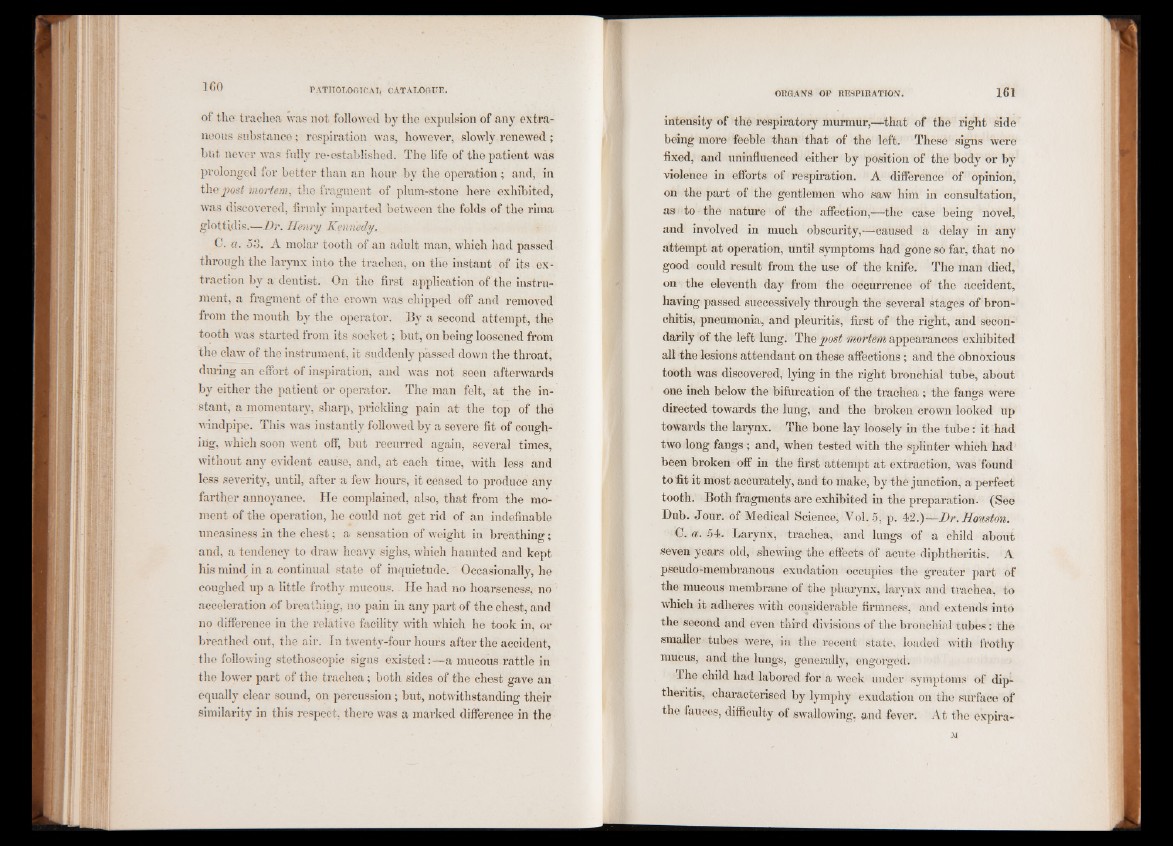
of the trachea was not followed by the expulsion of any extraneous
substance; respiration was, however, slowly, renewed ;
but never was full}7 re-established. The life of the patient was
prolonged for better than an hour by the operation; and, in
the post mortem, the fragment of plum-stone here exhibited,
was discovered, firmly imparted between the folds of the rima
glottidis.—Dr. Henry Kennedy.
0. ci. 53. A molar tooth of an adult man, which had passed
through the larynx into the trachea, on the instant of its extraction
by a dentist. On the first application of the instrument,
a fragment of the crown was chipped off and removed
from the mouth by the operator. By a second attempt, the
tooth was started from its socket; but, on being loosened from
the claw of the instrument, it suddenly passed down the throat,
during an effort of inspiration, and was not seen afterwards
by either the patient or operator. The man felt, at the instant,
a momentary, sharp, prickling pain at the top of the
windpipe. This was instantly followed by a severe fit of coughing,
which soon went off, but recurred again, several times,
without any evident cause, and, at each time, with less and
less severity, until, after a few hours, it c,eased to produce any
farther annoyance. He complained, also, that from the moment
of the operation, he could not get rid of an indefinable
uneasiness in the chest; a sensation of weight in breathing;
and, a tendency to draw heavy sighs, which haunted and kept
his mind, in a continual state of inquietude. Occasionally, he
coughed up a little frothy mucous.. He had no hoarseness^ no
acceleration of breathing, no pain in any part of the chest, and
no difference in the relative facility with which he took in, or
breathed out, the air. In twenty-four hours after the accident,
the following stethoscopic signs existed:—a mucous rattle in
the lower part of the trachea; both sides of the chest gave an
equally clear sound, on percussion; but, notwithstanding their
similarity in this respect, there was a marked difference in the
intensity of the respiratory murmur,—that of the right side
being more feeble than that of the left. These signs were
fixed, and uninfluenoed either by position of the body or by
violence in efforts of respiration. A difference of opinion,
on the part of the gentlemen who saw him in consultation,
as to - the nature of the affection,—the case being novel,
and involved in much obscurity,—caused a delay in any
attempt at operation, until symptoms had gone so far, that no
good could result from the use of the knife. The man died,
on the eleventh day from the occurrence of the accident,
having passed successively through the several stages of bronchitis,
pneumonia, and pleuritis, first of the right, and secondarily
of the left lung. The post mortem appearances exhibited
all the lesions attendant on these affections; and the obnoxious
tooth was discovered, lying in the right bronchial tube, about
one inch below the bifurcation of the trachea : the fangs were
directed towards the lung, and the broken crown looked up
towards the larynx. The bone lay loosely in the tube: it had
two long fangs ; and, when tested with the splinter which had
been broken off in the first attempt at extraction, was found
to fit it most accurately, and to make, by the junction, a perfect
tooth. Both fragments are exhibited in the preparation. (See
Dub. Jour, of Medical Science, Vol. 5, p. 42.)—Dr. Houston.
0. a. 54. Larynx, trachea, and lungs of a child about
seven years old, shewing the effects of acute diphtheritis. A
pseudo-membranous exudation occupies the greater part of
the mucous membrane of the pharynx, larynx and trachea, to
which it adheres with considerable firmness, and extends into
the second and even third divisions of the bronchial tubes: the
smaller tubes were, in the recent state, loaded with frothy
mucus, and the lungs, generally, engorged.
The child had labored for a week under symptoms of dip-
theritis, characterised by lymphy exudation on the surface of
the fauces, difficulty of swallowing, and fever. At the expira